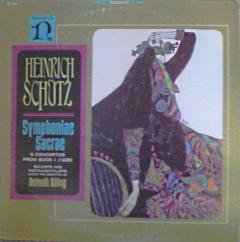Heinrich Schutz - Symphonaie Sacrae (1968)
Heinrich Schutz - Symphonaie Sacrae (1968)

1. Fili mi Absalom 6:45 2. Venite ad me 8:05 3. Buccinate in Neomenia Tuba – Jubilate Deo 7:14 4. O Quam tu Pulchra es – Veni de Libano 4:40 5. In te, Domine, Speravi 10:10 6. Anima mea liquefacta est – Adjura vos, Filiae Jerusalem 8:37 Lothar Brandes - Cornett Alfred Sous, Willy Schnell - Oboe Jürgen Gode - Bassoon Hannelore Michel - Cello Georg Hörtnagel - Double Bass Martin Galling - Harpsichord Gerhard Braun, Hartmut Strebel - Recorder Helmuth Heincke, Richard Zettler - Trombone Robert Bodenröder - Trumpet [Clarino] Edward H. Tarr - Trumpet [Clarino], Cornett Susanne Lautenbacher, Werner Keltsch - Violin Helmuth Rilling - conductor
Heinrich [Henrich] Schütz was a German composer and organist, generally regarded as the most important German composer before J.S. Bach and is often considered to be one of the most important composers of the 17th century along with Claudio Monteverdi. He wrote what is thought to be the first German opera, Dafne, performed at Torgau in 1627; however, the music has since been lost.
Heinrich Schütz was one of the last composers to write in a modal style, with non-functional harmonies often resulting from the interplay of voices; contrastingly, much of his music shows a strong tonal pull when approaching cadences. His music makes extensive use of imitation, in which entries often come in irregular order and at varied intervals. Fairly characteristic of Schütz's writing are intense dissonances caused by two or more voices moving correctly through dissonances against the implied harmony. Above all, his music displays extreme sensitivity to the accents and meaning of the text, which is often conveyed using special technical figures drawn from musica poetica, themselves drawn from or created in analogy to the verbal figures of Classical Rhetoric.
Almost no secular music by Heinrich Schütz has survived, save for a few domestic songs (arien) and no purely instrumental music at all (unless one counts the short instrumental movement entitled "sinfonia" that encloses the dialogue of Die sieben Worte), even though he had a reputation as one of the finest organists in Germany.
Heinrich Schütz was of great importance in bringing new musical ideas to Germany from Italy, and as such had a large influence on the German music which was to follow. The style of the north German organ school derives largely from Schütz (as well as from Netherlander Jan Pieterszoon Sweelinck); a century later this music was to culminate in the work of J.S. Bach. ---bach-cantatas.com
download: uploaded yandex 4shared mediafire mega zalivalka filecloudio anonfiles oboom
Zmieniony (Niedziela, 04 Maj 2014 09:13)
